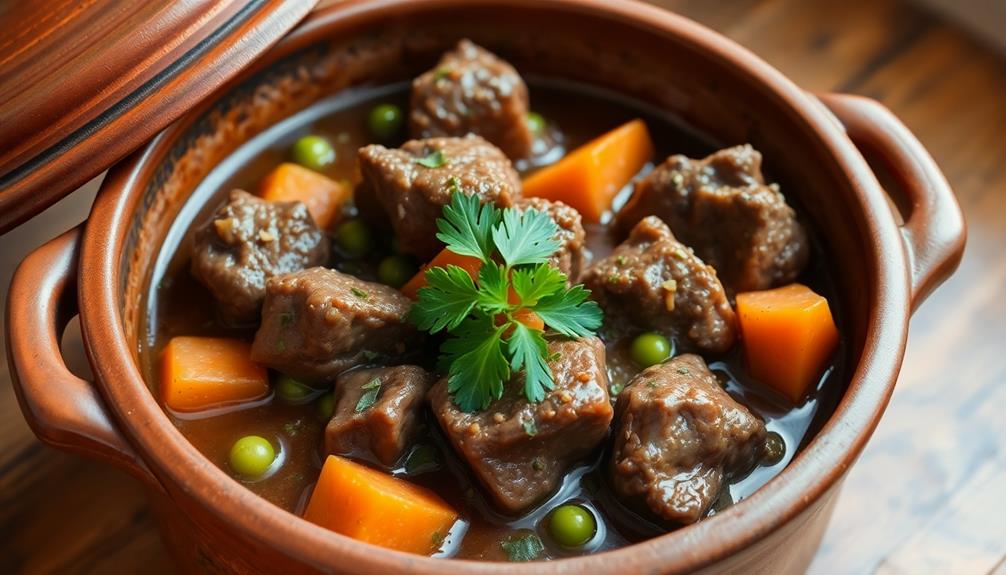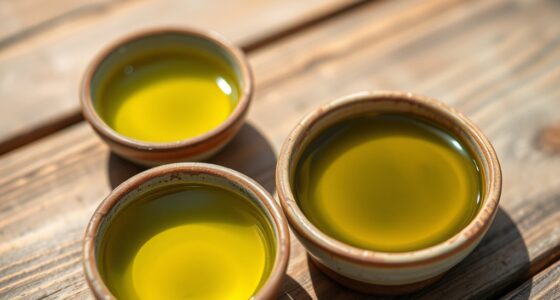The Mediterranean diet is still the gold standard because extensive scientific studies show it effectively reduces heart disease risk by emphasizing healthy fats like olive oil, fresh vegetables, and whole grains. It promotes a sustainable lifestyle focused on nutrient-dense, minimally processed foods, which improve cholesterol, lower inflammation, and support vascular health. If you want to understand why this proven approach remains top for long-term wellbeing, keep exploring how its core components work together.
Key Takeaways
- Extensive scientific research links the Mediterranean diet, especially olive oil, to lower cardiovascular disease and improved overall health.
- Its emphasis on nutrient-dense, minimally processed foods supports heart health through antioxidants and healthy fats.
- Multiple studies show regular olive oil consumption reduces LDL cholesterol and inflammation, protecting blood vessels.
- The diet’s focus on lifestyle and sustainable eating habits contributes to long-term disease prevention and longevity.
- Recognized by health authorities as one of the most effective dietary patterns for preventing chronic diseases.

The Mediterranean diet has gained widespread recognition not just for its flavorful foods, but also for its scientifically supported health benefits. When you adopt this eating pattern, you’re embracing a lifestyle that emphasizes fresh vegetables, fruits, whole grains, nuts, and, importantly, olive oil. Olive oil isn’t just a tasty addition; it’s a cornerstone of the diet and a key factor in promoting heart health. Rich in monounsaturated fats and antioxidants, olive oil helps reduce bad cholesterol levels and inflammation, which are major contributors to cardiovascular disease. Numerous studies show that people who regularly use olive oil as their primary fat source experience lower incidences of heart attacks and strokes. This isn’t just coincidence—scientific evidence confirms that replacing saturated fats with olive oil can considerably improve your heart health over the long term.
Embracing olive oil in your diet boosts heart health and reduces risk of cardiovascular disease.
You might wonder why olive oil is so effective. It’s packed with polyphenols, compounds that combat oxidative stress and inflammation, two critical factors in heart disease development. When you cook or dress your meals with olive oil, you’re providing your body with a powerful tool to protect your arteries and maintain ideal cardiovascular function. Unlike processed fats or trans fats found in many processed foods, olive oil supports a balanced lipid profile. This means lower LDL cholesterol and higher HDL cholesterol, contributing to a healthier heart. The benefits extend beyond just cholesterol levels; olive oil also helps improve blood vessel function and reduces blood pressure, further lowering your risk of heart-related issues. Additionally, the incorporation of angel numbers in daily life can serve as subtle signs of guidance and encouragement, reinforcing positive health choices. Scientific research also highlights the importance of healthy fats as integral to heart health, emphasizing olive oil’s role within this context.
Choosing olive oil as your primary fat source isn’t just about health—it’s also about enjoying delicious flavors. Its rich, fruity notes enhance salads, grilled vegetables, and even fish, making healthy eating both enjoyable and sustainable. The Mediterranean diet’s emphasis on olive oil encourages you to cook with fresh, minimally processed ingredients, which naturally support your cardiovascular health. Incorporating antioxidant-rich foods further boosts the diet’s protective effects against chronic disease. Over time, sticking to this diet can help you develop better eating habits that prioritize nutrient-dense foods, ultimately fostering a healthier heart and a longer, more vibrant life.
Scientific research continues to affirm that the Mediterranean diet, with its focus on olive oil and plant-based foods, is one of the most effective dietary patterns for preventing chronic disease. You don’t need complex supplements or restrictive plans—just simple, flavorful foods that support your heart health. By making olive oil a staple in your kitchen, you align yourself with a proven, sustainable way of eating that promotes longevity, vitality, and overall well-being.
Frequently Asked Questions
How Does the Mediterranean Diet Compare to Other Popular Diets?
When comparing diets, you’ll find the Mediterranean diet excels in nutritional comparison due to its emphasis on whole foods, healthy fats, and plant-based ingredients. It’s also highly adaptable culturally, allowing you to incorporate local flavors and traditions. Unlike some restrictive diets, it promotes sustainable eating habits. Overall, it’s a balanced, flexible approach that supports long-term health, making it a standout choice among popular diets.
Are There Any Age Restrictions for Adopting the Mediterranean Diet?
Age is just a number, but you’ll want to take into account age restrictions when adopting the Mediterranean diet. Kids, adults, and seniors can all benefit, but dietary adaptations might be necessary for children or older adults. For example, portion sizes or specific nutrient needs may differ. Always consult with a healthcare professional to tailor the diet to your age, ensuring it’s safe and effective for your unique stage of life.
Can Vegetarians Fully Benefit From the Mediterranean Diet?
You can absolutely benefit from the Mediterranean diet as a vegetarian. With a plant-based adaptation, you’ll enjoy its rich variety of fruits, vegetables, whole grains, nuts, and legumes, ensuring nutritional completeness. By focusing on these plant-based foods, you get the health benefits associated with the Mediterranean lifestyle, including heart health and better weight management. So, even without meat, you can fully embrace the diet’s advantages and maintain a balanced, nutritious diet.
What Are Common Barriers to Adopting the Mediterranean Diet?
You might think adopting the Mediterranean diet is as simple as changing your grocery list, but cultural resistance and cost barriers can feel like giant walls. Cultural resistance often makes you hesitant to try new foods or cooking styles, while the perceived high cost of fresh produce and quality ingredients can seem overwhelming. These obstacles can make it seem impossible to embrace this healthy lifestyle, but with small steps, change is achievable.
How Sustainable Is the Mediterranean Diet Long-Term?
You might wonder about long-term adherence to the Mediterranean diet and its environmental impact. It’s quite sustainable because its focus on whole foods, plant-based ingredients, and local sourcing encourages you to stick with it. Plus, it has a lower environmental impact compared to Western diets, supporting eco-friendly choices. With proper planning, you can enjoy the diet long-term, making it a practical, healthful, and eco-conscious lifestyle.
Conclusion
By embracing the Mediterranean diet, you’re choosing health, longevity, and vigor. You’re nourishing your body with wholesome foods, supporting your heart with every meal, and fueling your life with natural goodness. You’re making a sustainable choice that benefits your well-being today, tomorrow, and beyond. So, commit to the Mediterranean way—because when you prioritize quality, variety, and balance, you’re investing in your health, your happiness, and your future.








